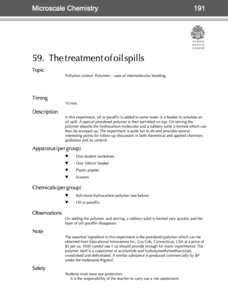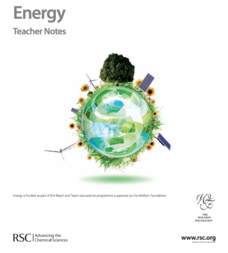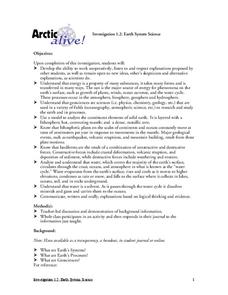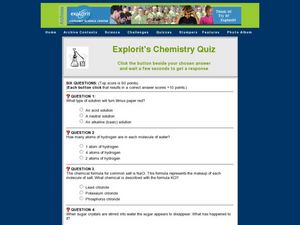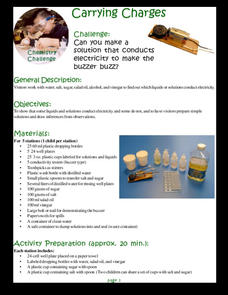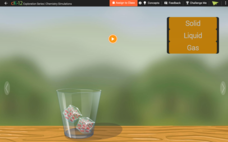Curated OER
Disposable Diaper Comparison and Mystery Powder Identification
Students investigate which diaper is the most absorbent. In this chemistry lesson, students calculate how much water is absorbed by diapers. They identify an unknown powder based on physical and chemical properties.
Curated OER
The Nature of Chemical Change: Acting Out an Example
Learners identify the signs that a chemical reaction took place. In this chemistry instructional activity, students role play the movement of different molecules of matter. They classify matter according to their properties.
Royal Society of Chemistry
A Cartesian Diver—Classic Chemistry Experiments
Sometimes the simplest experiments leave the biggest impression! Introduce young chemists to the Cartesian Diver by having them make one of their own. Use the Diver to further their study of liquids and gases, as well as compression.
Royal Society of Chemistry
The Treatment of Oil Spills—Microscale Chemistry
When oil spills happen, how is the oil cleaned up? Pupils of polymer science discover an amazing substance that turns oil into a solid during a microscale experiment. Individuals observe oil or paraffin before and after addition of the...
Royal Society of Chemistry
Energy—Gifted and Talented Chemistry
What has more energy than a room full of pupils after a fire drill? This lesson plan! Explore the changes in energy during different chemical reactions, discover why some reactions feel cold and others feel hot, and tackle the concept of...
Curated OER
Earth System Science
Students explore the Earth and its ability to support life. They discuss the geosphere and the water cycle and complete the Water Wonders activity. After completing the activity, they respond in their journals and reflect upon the...
Curated OER
Breaking it Down
Students discover how water expands when frozen during a glacier. In this matter lesson, students fill a glass jar with water, leaving no room for air in the jar and place it in the freezer. Students retrieve the jar and notice the...
Curated OER
Monomer and Polymer Chemistry
Middle schoolers explain monomer/polymer chemistry of starches and sugars.
Curated OER
Is Your Water Clean?
Students compare water quality of different sources. They test water samples for odor, phosphates, pH, bacteria, and dissolved solids. they fill out a data table and answer questions about their findings.
Curated OER
Explorit's Chemistry Quiz
In this chemistry worksheet, students complete a six question multiple choice quiz about chemistry. This is an on-line interactive worksheet.
Curated OER
Water: Friend and Foe
Young scholars brainstorm ways to prevent fires from home. In this technology lesson, students create fire-safety posters for their school. They research the internet and explore other resources to get information for the poster.
CK-12 Foundation
It's Just a Phase
Explore the phases of water as temperature rises. Pupils consider the idea that temperature remains constant during each phase change. An interactive exercise allows your young scientists to observe the temperature and molecular...
Sciencenter
Carrying Charges
What's all the buzz about electricity? Scholars take part in a scientific activity to test the conductivity of liquids and solutions. They first see if water, salad oil, alcohol, and vinegar cause a buzzer to buzz when electrodes are...
CK-12 Foundation
Going Fishing
Why do some things float and others sink? A creative simulation allows learners to adjust mass and volume of an object to affect its buoyancy in water. A graph records the effect of each manipulation.
CK-12 Foundation
What's the Matter?
What makes ice, water, and steam different? Their molecular arrangements are the same, but their movements are different. Individuals make this conclusion by completing the simulation activity.
Curated OER
Elements Compounds and Mixtures
For this science worksheet, students apply science basic knowledge of chemistry to the puzzles that are listed for the four parts of the sheet while focusing upon the identification of a metalloid.
Curated OER
Properties of Salt
Students see how the properties of salt affect the color of flame, the flow of electricity, and the freezing temperature of water. They identify salt and sugar crystals under a microscope and discuss various practical uses of salt.
American Chemical Society
Density: Sink and Float for Solids
Steal cubes sink, but steal ships float. Lesson explores the density of solids as well as the density of water in determining what will sink and what will float. A hands-on group activity helps pupils see that weight and volume are...
Cornell University
Forensic Science: Case of the Missing Diamond Maker
Someone stole a diamond-making machine. Who done it? Scholars use forensic science at six different stations to determine the culprit. They analyze fingerprints, use their senses, and complete chemistry experiments to determine the...
Curated OER
Light Stick Chemistry
In this descriptive investigation activity, 6th graders conduct an investigation to determine if heat energy affects the brightness of a light stick. The students will form a prediction, collect data and answer 3 conclusion questions.
American Chemical Society
Production of a Gas - Controlling a Chemical Reaction
Though the publisher designated this unit for use with third through eighth grades, this particular lesson would be best used with middle schoolers due to the specific measurement skills required. Basically, they set up the reaction...
American Chemical Society
Controlling the Amount of Products in a Chemical Reaction
Everyone enjoys combining baking soda and water. Here is a lesson that challenges scholars to analyze the reaction three different ways — the real substances, the chemical equation, and the molecular models. Class...
Curated OER
Ice
Students examine the different propereties of ice, such as freezing temperature. In this scientific lesson students complete several activities using ice, like making ice cream.
Curated OER
Exothermic Rehydration of Gypsum
Students observe exothermic reactions in the lab using plaster. In this chemistry lesson, students collect data from their experimental set up every five minutes. They explain the different stages in the hardening of plaster.
Other popular searches
- Lake Water Chemistry
- Water Chemistry Ions
- Co2 Water Chemistry
- Water Chemistry Lesson Plans
- Ocean Water Chemistry
- Basic Water Chemistry
- Water Chemistry Properties
- Storm Water Chemistry
- Marine Water Chemistry
- Size vs. Water Chemistry
- Chemistry of Water
- Water Chemistry Nitrate



